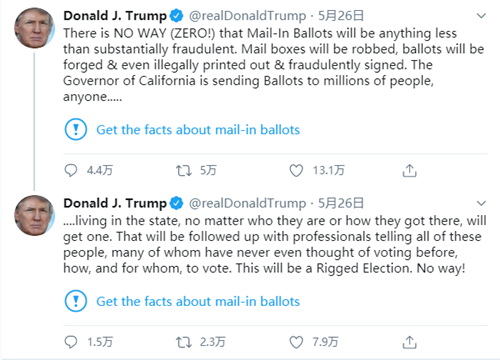

On June 29, Reddit, one of the largest social networking and message board websites in the U.S., banned its biggest community devoted to U.S. President Donald Trump as part of an overhaul of its hate speech policies, according to The New York Times.
The community, called “The_Donald,” is home to more than 790,000 users who post memes, viral videos and messages of support for Trump. Reddit executives said the group, which has been highly influential in cultivating Trump’s online base, had consistently broken its rules by allowing people to target and harass others with hate speech.
Trump supporters believed the ban was politically driven. However, to strengthen self-supervision, U.S. social media platforms that have claimed to be neutral in the face of whatever users publish have begun to ban remarks that fan hatred, engage in personal attacks and disseminate false information.

(Source: Donald Trump's Twitter account)
On May 26, Twitter labeled two tweets from Donald Trump making false statements about mail-in voting as “potentially misleading.” It was the first time the platform had fact-checked the president.
Trump responded on Twitter by saying the company was “now interfering in the 2020 Presidential Election” and that he, as President, will not allow it to happen. On the night of May 28, he signed an executive order on social media companies.
Later, social media platforms started fighting back. Twitter began placing warnings on some of the president’s tweets, Snap has said it will stop promoting Mr. Trump's Snapchat account, Twitch banned Trump’s account for “hateful conduct” and YouTube suspended six leading white nationalist accounts.
While other social media companies were taking steps to restrict or ban Trump’s remarks or accounts, Facebook chose to take a hands-off approach to inflammatory posts, a move that brought serious consequences for the social media giant.
On June 17, a coalition of six organizations, including the Anti-Defamation League (ADL) and the National Association for the Advancement of Colored People (NAACP), called on Facebook’s advertisers to hit pause on ad spending on Facebook and Instagram for July 2020 to demand that Facebook address racism across their platforms via the Stop Hate for Profit campaign.
The ad boycott caused Facebook’s shares to fall by 8.3 percent, removed $56 billion from the company’s market value, and led to a $7.2 billion drop in Zuckerberg’s personal wealth.
Under this pressure, Zuckerberg said on June 26 that Facebook will be incorporating new policies under which the company will ban ads that claim people from a specific race, ethnicity, nationality, caste, gender, sexual orientation or immigration origin are a threat to the physical safety or health of anyone else.
Facing the pressure from these social media platforms, Trump’s campaign team and allies have created accounts on Parler, which sells itself as a sanctuary for free speech. Parler also kicked off its #Twexit campaign, calling for disgruntled Twitter users to “vote with the feet” and leave the more powerful, ever-present platform.
According to a report by CNBC, Trump campaign manager Brad Parscale has also been on Parler since 2018. Eric Trump, the president’s son, and his wife, Lara, joined on the same day in May.
Two days after The Wall Street Journal named Parler as a possible alternative to Facebook and Twitter, Parler became the top-ranked iPhone app in the news category, ahead of Twitter and Reddit, and 24th overall, just behind Venmo and WhatsApp, according to App Annie. User growth surged to 1.5 million from 1 million over the course of about a week.
A Pew Research Center report indicated that about 72 percent of American adults had used at least one social media platform as of 2019. Time spent on social media increased as a result of the COVID-19 pandemic.
According to a survey conducted by Rasmussen Reports, 37 percent of voters under 40 say social media influences their politics.
"Social media is a contributing factor to the political divide in our country," explained Nathaniel Ivers, the department chairman and associate professor in the Department of Counseling at Wake Forest University.
With the 2020 U.S. Presidential Election approaching, social media platforms will no doubt become a battlefield for U.S. politicians and people to express their political views. Therefore, how social media platforms will strike a balance between free speech and political correctness will become a major issue.
 Fire brigade in Shanghai holds group wedding
Fire brigade in Shanghai holds group wedding Tourists enjoy ice sculptures in Datan Town, north China
Tourists enjoy ice sculptures in Datan Town, north China Sunset scenery of Dayan Pagoda in Xi'an
Sunset scenery of Dayan Pagoda in Xi'an Tourists have fun at scenic spot in Nanlong Town, NW China
Tourists have fun at scenic spot in Nanlong Town, NW China Harbin attracts tourists by making best use of ice in winter
Harbin attracts tourists by making best use of ice in winter In pics: FIS Alpine Ski Women's World Cup Slalom
In pics: FIS Alpine Ski Women's World Cup Slalom Black-necked cranes rest at reservoir in Lhunzhub County, Lhasa
Black-necked cranes rest at reservoir in Lhunzhub County, Lhasa China's FAST telescope will be available to foreign scientists in April
China's FAST telescope will be available to foreign scientists in April "She power" plays indispensable role in poverty alleviation
"She power" plays indispensable role in poverty alleviation Top 10 world news events of People's Daily in 2020
Top 10 world news events of People's Daily in 2020 Top 10 China news events of People's Daily in 2020
Top 10 China news events of People's Daily in 2020 Top 10 media buzzwords of 2020
Top 10 media buzzwords of 2020 Year-ender:10 major tourism stories of 2020
Year-ender:10 major tourism stories of 2020 No interference in Venezuelan issues
No interference in Venezuelan issues
 Biz prepares for trade spat
Biz prepares for trade spat
 Broadcasting Continent
Broadcasting Continent Australia wins Chinese CEOs as US loses
Australia wins Chinese CEOs as US loses